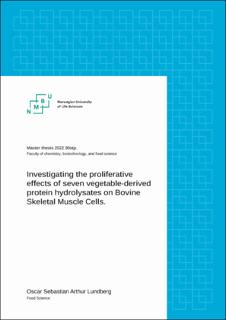| dc.contributor.advisor | Rønning, Sissel Beate | |
| dc.contributor.advisor | Wubshet, Sileshi Gizachew | |
| dc.contributor.author | Lundberg, Oscar Sebastian Arthur | |
| dc.date.accessioned | 2022-12-13T12:08:50Z | |
| dc.date.available | 2022-12-13T12:08:50Z | |
| dc.date.issued | 2022 | |
| dc.identifier.uri | https://hdl.handle.net/11250/3037472 | |
| dc.description.abstract | The cultured meat industry is rapidly growing and secured 1.38 billion$ in investments for 2021. Up to 95% of the total production cost is tied to the use of fetal bovine serum. Therefore, the most pressing issue for the industry is the generation of serum-free medias for sustained expansion of skeletal muscle cells. Discovering growth stimulators could directly be used in meat cultivation and be implemented in serum-free medias. The main goal of this study was to investigate the growth-promoting effects of seven vegetable-derived protein hydrolysates on bovine skeletal satellite/myoblast cells (MuSCs). Seven vegetable and one animal-derived protein concentrates were hydrolyzed with either alcalase or corolase. The hydrolysates were freeze-dried and characterized based on average molecular weight and molecular weight distribution with size exclusion chromatography. Furthermore, the hydrolysates were supplemented to MuSCs in normal serum conditions for 24, 48, and 96 hours. After incubation proliferation was measured with CyQuant proliferation assay to determine the supplementary effect of each hydrolysate. In the end, a DPP-IV assay was performed on hydrolysates to investigate DPP-IV inhibition. Size exclusion chromatography revealed the choice of raw material and enzyme affected the molecular weight and molecular weight distribution of peptides in the hydrolysates. The results show that Pea-isolate and pea concentrate hydrolyzed with corolase significantly increased proliferation by 63.3% and 54%, respectively, after 96 hours of incubation. Whey protein concentrate hydrolyzed with alcalase significantly increased proliferation by 37.6%. Faba-bean hydrolysates significantly reduced cell proliferation, while Oat hydrolysate did not affect proliferation in a major way. DPP-IV assay showed hydrolysates from pea-isolate and Whey protein to have the strongest inhibition of DPP-IV. We suggest that Pea-isolate/concentrate and whey protein concentrate hydrolysates have serum replacement potential and require further investigation. They hold promising growth-stimulating effects on MuSCs and could be useful in the development of a serum-free media formulation. | en_US |
| dc.language.iso | eng | en_US |
| dc.publisher | Norwegian University of Life Sciences, Ås | en_US |
| dc.rights | Attribution-NonCommercial-NoDerivatives 4.0 Internasjonal | * |
| dc.rights.uri | http://creativecommons.org/licenses/by-nc-nd/4.0/deed.no | * |
| dc.title | Investigating the proliferative effects of seven vegetable-derived protein hydrolysates on bovine skeletal muscle cells | en_US |
| dc.type | Master thesis | en_US |
| dc.description.localcode | M-MAT | en_US |

